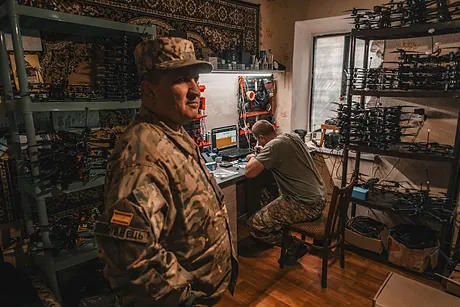Commander Tarás Myjailchuk, known by all his soldiers as El español, can be very funny, but when he gets angry, he is stormy: "Peace? The Russians? They didn't stop during Easter truce, nor on May 9th when they themselves requested it. Why would they stop attacking now?"
Tarás' sentiment is the same as the vast majority of Ukrainian soldiers currently fighting on the front. Nobody trusts the Kremlin or its agreements. They can list off all the breaches, starting with the foundational one, the Budapest Protocol of 1994, in which Russia recognized Ukraine's integrity and sovereignty in exchange for its nuclear arsenal.
It doesn't take much insight to realize that, at least on the Zaporiyia front where we are, Russian attacks have not decreased at all. Artillery detonations sound from both sides, while terrifying drones continue to fly 24/7 to keep everyone in the trenches with their heads down.
Nobody pays much attention to news about the ceasefire on the front or finds it credible. First, because they have too much work fighting the Russians to waste time on illusions. And then, because those same illusions can vanish in an instant. Frontline soldiers are stoic by nature: they savor every meal as if it were their last, have learned to doze off under bombs, and their mantra is to survive until the next day. The promise of a better tomorrow can distract them from their goals.
Tarás, who will receive the Hero of Ukraine medal this month, the highest military decoration in his country, has lived in Spain since 2005, where his family still resides. "I have two hearts, one Spanish and one Ukrainian", he says emotionally. Tarás' grandfather fought in the Spanish Civil War as part of the International Brigades, his father was a sailor on a nuclear submarine, and he himself was born in Murmansk, Russia. He served in the Soviet military and has participated in four wars (Afghanistan, Nagorno-Karabakh, Transnistria, and Ukraine). He listens to Latin reggaeton songs in his military vehicle and projects videos of bombshell girls on the screen while humming the melodies.
In any case, negotiation is on the table and nobody wants to be the last casualty of the war. That's why investment in drones is intensifying these days, research in technology is multiplying, and significant resources are dedicated to battlefield robotization: "The Russians are like a plague of locusts. They have plenty of cannon fodder and launch assaults every day. Most of them go nowhere, but they don't care. We can't adopt that strategy. We have far fewer people, so we have to take care of our own," says Tarás. "That's why we are increasingly using drones, so our young ones don't have to die," he comments.
In the drone workshop of Brigade 65, Capellán (his war nickname) assembles dozens of drones daily from fiber optic skeletons and electronic parts with a powerful microchip. Drones of at least three different types accumulate in columns. But the most important part, the software, is what Capellán introduces. It's a program that prevents the drone from being hacked by the Russians.
- Is it easy to hack an enemy drone in real-time?
- Of course. I'll show you a hacked one. Look at the screen (His computer displays the front view of a drone in flight, searching for targets).
- Yes. Now we can see where it's going without them knowing, but we still can't control it, although we can also get into its brain to bring it down, and that's what we're doing now. That's why protecting them with this software is so important.
We ask Capellán about peace talks, and it's as if we had asked about the breeding of a platypus. Everyone here sees the political process more like a theater than something real. "He's afraid to negotiate with me," Zelenski said yesterday about his trip to Turkey, where he claims he will wait for Putin. Trump's decision to visit Istanbul depends on whether the Russian autocrat goes, but the Kremlin assures that "the Russian delegation will be represented by the Foreign Minister, Sergey Lavrov."
